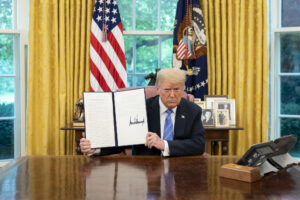Do you know any Putinists, even a single one? No, of course not. There are people who are similar to Putin, like Xi Jinping. There are others who take their inspiration from him, like Viktor Orban. Still others, like Lula, congratulate themselves on having avoided – thanks to Putin – a tête-à-tête with the American power. That makes a lot of allies and like-minded people, but not a crowd, and that is the big difference between Russia and the USSR.
In Soviet times, communism brought together hundreds of millions of believers throughout the world, all of whom venerated Stalin right up to the 20th Congress. The “Little Father of the Peoples” was thus able to remain at the helm for a lifetime with nothing that could threaten him, whereas Vladimir Putin is a mere mortal. As long as he appears strong, all is well for him, but as soon as that is no longer the case, his days will be limited and, from Ukraine to the Caucasus, his weakening is already obvious.
The new Russian diaspora therefore will not die on foreign soil. Unlike the diaspora of the 1920s, it is an opposition in exile, the real Russia, in the same way that the free France was the real France during the Second World War, and because it is destined to influence the destiny of the Federation and no doubt even to govern it, its historic task is to develop a pluralist political culture and to lay the foundations for a peaceful transition to democracy.
This opposition, which is trying to find itself and is closing its ranks from one meeting to the next, cannot in other words be content with debating the need for a Nuremberg of communism and the merits and drawbacks of lustration. Many people will have to account for their crimes. The history of Sovietism, Yeltsinism, Putinism and Tsarist absolutism has yet to be written but, for the time being, we must ensure that post-Putinism does not amount to a palace revolution. For the time being, the democrats must ensure the triumph of democracy by offering Russia a programme that can rally whole swathes of the cities and countryside to a mass opposition that is no longer confined to the privacy of souls and kitchens.
What does the opposition in exile propose to do to rebuild public education? How would it reorganise the health system? How could Russia prepare for and benefit from the warming of its eastern lands? Should it have a French-style presidential system or a British-style parliamentary system? Should it join the European Union, or even consider joining one day?
The answers to these questions, and many others, are to be found in debates open to the press and in particular to the Russian media in exile. Russia needs to see an opposition that thinks outside the box and is concerned – and this is essential – with social justice. What kind of taxation should be introduced to fund public services? Should we, for example, go back on the privatisations of the 1990s, or at least on their highly questionable process? Could a flat-rate tax correct the plundering of national wealth on which so many gigantic fortunes have been built? And how can justice be dispensed when the Russian judiciary is what we know it to be?
During the Occupation, the French Resistance negotiated a programme between its various currents that has fed into France’s policies to this day. Russian newspapers and websites that have taken refuge abroad should initiate such discussions, because it is in these debates in exile that the pluralist, peaceful and democratic Russia of tomorrow will be forged. And then there is one more thing that I am also saying and drilling at all the meetings to which the Russian opposition invites me as a Member of the European Parliament. The opposition in exile, the real Russia, urgently needs three spokespersons to embody it, people who are already well known throughout the world and whose intellectual prestige and moral integrity make them ideal interlocutors for the major capitals.



